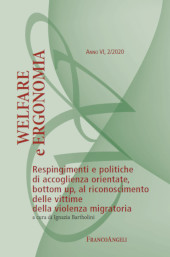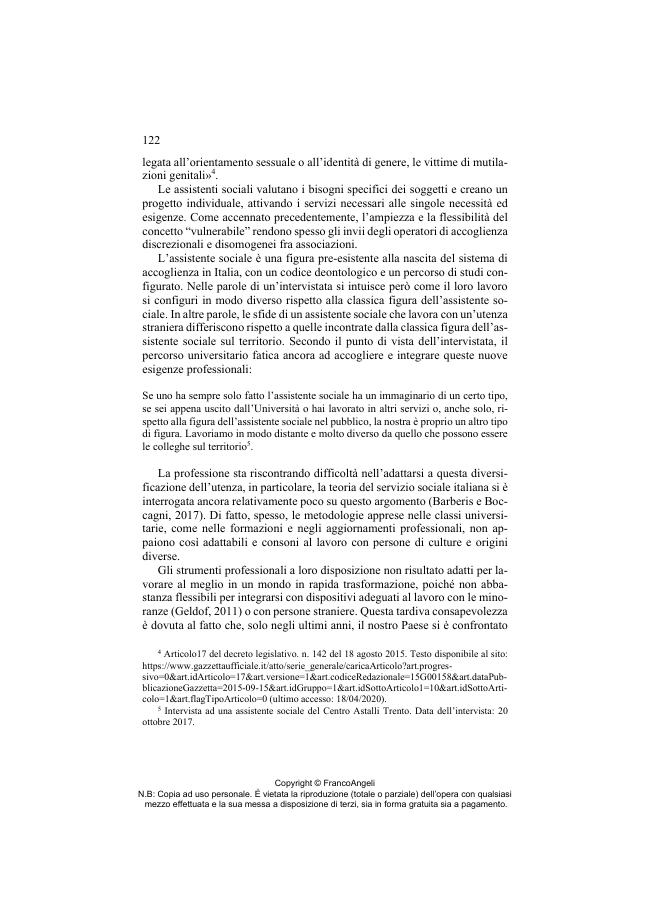Ruoli, mansioni e competenze professionali all'interno del mondo dell'accoglienza : professionalità a confronto
113-131 p.
La ricerca persegue l'obiettivo di formulare e rispondere ad alcune domande relative al ruolo e alle competenze professionali dell'operatore che lavora con richiedenti e titolari di protezione internazionale. L'interrogativo di fondo nasce sul campo grazie all'esperienza della ricercatrice come operatrice di accoglienza presso la Provincia Autonoma di Trento, che costituisce il caso empirico approfondito. L'osservazione partecipante ha fatto emergere la rilevanza che le scelte, i ruoli e i valori degli operatori assumono nell'influenzare il significato dell'accoglienza praticata e talora persino i percorsi d'integrazione dei soggetti beneficiari. Oltre all'osservazione, la ricerca si è avvalsa di interviste in profondità a 55 operatori.
Focalizzandosi sulle figure professionali che più lavorano con il concetto di "vulnerabilità" - operatori di accoglienza, assistenti sociali e psicologi - l'analisi va ad individuare i punti di intersezione e contatto tra le varie professionalità, permettendo di rilevare le micro-tattiche che sono messe in atto nella quotidianità del lavoro, rispetto alla formalità delle procedure. Si vedrà come l'operatore di accoglienza si sia di fatto professionalizzato all'interno del sistema, luogo dove ha sviluppato le proprie competenze e costruito le proprie "grammatiche d'azione".
Su un versante parallelo e a tratti convergente, assistenti sociali e psicologi sono invece professionalità che si sono formate "fuori" dal sistema-mondo dell'accoglienza ma, una volta arrivate "dentro", si sono trovate ad assumere ruoli e competenze professionali in parte nuovi, che possono talora far emergere contraddizioni e contrasti, ma anche innovative forme di integrazione con quelle degli operatori di accoglienza. [Testo dell'editore].
The research pursues the objective of formulating and answering some questions relating to the role and professional skills of the social workers with asylum seekers and refugees in the Italian reception system. The case study is the Autonomous Prov a diary field notes, 55 interviews with social workers. While working in a Temporary Reception Center, with the Association Centro Astalli, the researcher has observed how the different actions, ideals and roles of social workers significantly influence and shape the experiences of asylum seekers. This study focuses in the professional figures most involved with "vulnerable" migrants - case workers, social workers and psychologists - and identify their professional point of intersection. These connections allow to detect the micro-tactics implemented in their everyday working life, comparing them with the formality of institutional procedures.
An attempt was therefore made to understand which definition of "vulnerability" is taken into consideration among the various professional figures and whether there is a univocal and uniformly accepted interpretation of who a "vulnerable migrant" is. The hypothesis is that the case worker with asylum seekers and refugees has in fact professionalized within the reception system, where he developed his skills and built his own "grammars of action" (Boltanski and Thévenot, 1999). On a parallel and at times converging side, social workers and psychologists are instead professionals who were trained "outside" the world of reception systems of asylum seekers and refugees, but, once they arrived "inside", they found themselves taking on roles and professional skills that were partly new, which can sometimes bring out contrasts and contradictions, but also innovative forms of integration with those of the case workers.
This basic difference entails many tensions, clashes and disagreements, especially between case workers and social workers. In particular, it often happens that the reception operator is not only not recognized as a professional and/or professionalizing worker, but is also one of the few professionals that hardly find work outside the reception system, thus risking to be (a little more) precarious than the others. The research highlights the need to critically reflect on the communities of practices and on the (new) professional skills that are built and intertwined in a working field such as the one of the reception centers. [Publisher's text].
Is part of
Welfare e ergonomia : VI, 2, 2020-
Articles from the same issue (available individually)
-
Information
ISSN: 2531-9817
DISCIPLINES
KEYWORDS
- Migrazione, richiedenti asilo, lavoratori dell'accoglienza, vulnerabilità, competenze
- Migration, asylum seekers, social workers with asylum seekers and refugees, vulnerabilities, competences



